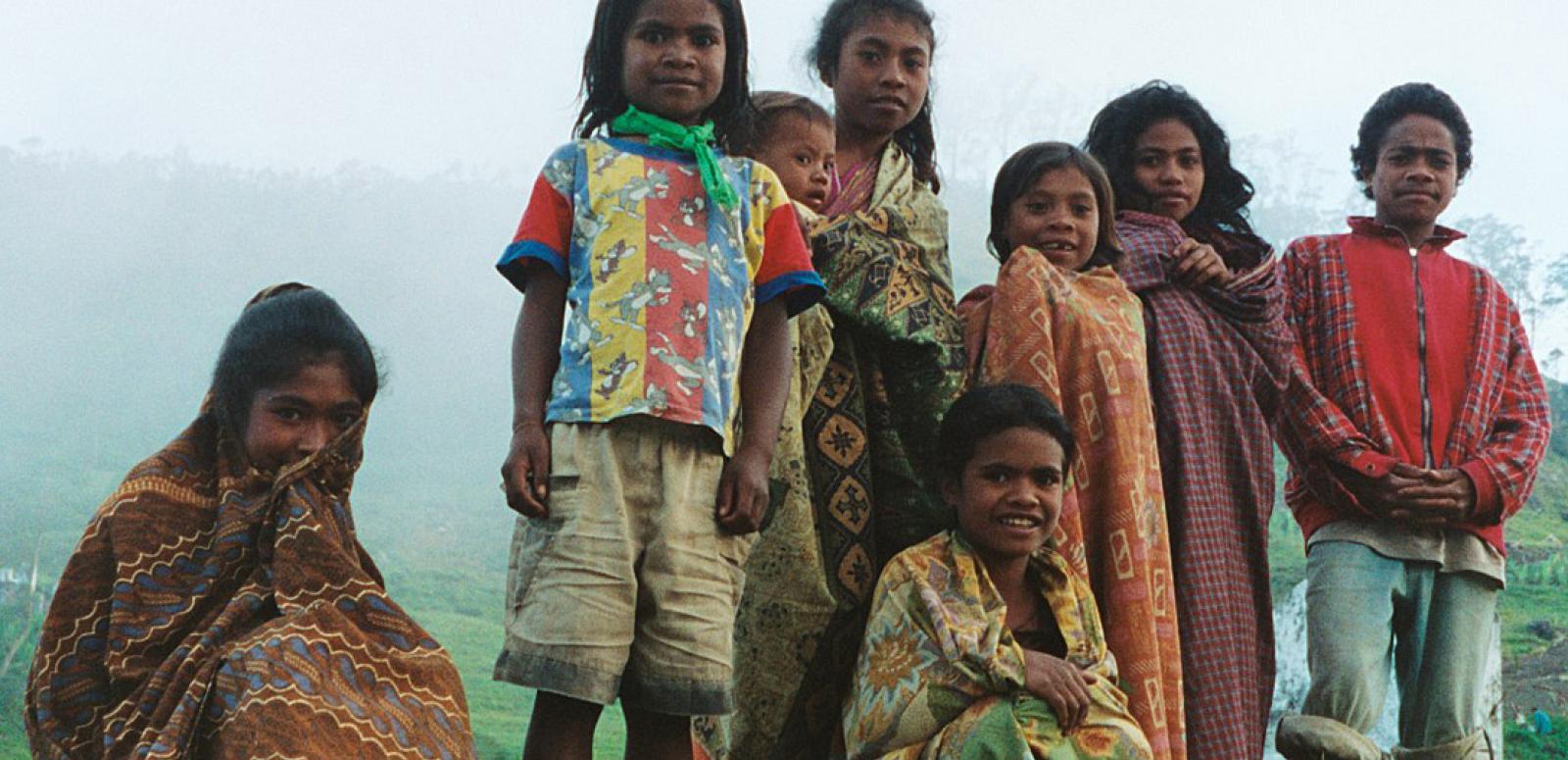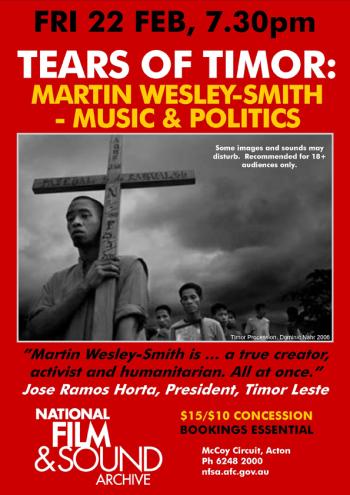

Timor - The First Decade
Panel moderator Vincent Plush (far right) introduces the panel (from his left): Neco Sarmento, Robyn Sloggett, Andrew McWilliam and Martin Wesley-Smith. Individually, they discuss their personal backgrounds in relation to Timor Leste.
In this month of May 2012, the NFSA joins in celebrating the 10th anniversary of the declaration of the Democratic Republic of Timor Leste.
In recent years the NFSA has developed special relationships with the people and culture of Timor Leste through its collection holdings, special events and official government-to-government contacts.
The NFSA holds items which document the history of Timor throughout most of the 20th century and the Timorese struggle for self-determination. In recent years, the NFSA has begun to collate and interpret the significance of these items. Collectively, they will yield a fuller understanding of events that have led to the creation of the first nation-state of the 21st century, now the 191st member state of the United Nations.
Among these are recordings of clandestine radio messages from the liberationist Radio Maubere transmitted to Darwin in the early days of the Indonesian occupation which began in December 1975.
The Indonesian annexation of Timor occurred at the very time that Australia was preparing for a general election, in the wake of the dismissal of the Whitlam government in November 1975. While most Australians were preoccupied with domestic politics, elements of the Australian press were alert to ominous events unfolding in nearby Portuguese Timor (as it was known at the time). Recognising that the situation was fast becoming dangerous, most correspondents retreated to safety, but five television newsmen stayed. From a vantage point in the tiny mountain town of Balibo, they prepared to cover the inevitable Indonesian invasion. On 16 October 1975, they were executed by Indonesian forces. The newsmen are known to us as ‘the Balibo Five’.
Less well known is another Australian, Roger East, the 50-year-old correspondent for AAP-Reuters, who went to Timor to uncover the still confused story of the demise of the Balibo Five. East was captured by the Indonesian military and executed by firing squad the day after the invasion and his body thrown into Dili harbour. He is often referred to as the ‘forgotten sixth member’ of the Balibo Five.
The deaths of these Australian newsmen, caught up in an invasion from which they assumed they would be immune, have been reviewed and counter-reviewed by investigations and coronial inquiries for years. The emotive circumstances of their demise have been captured in words, music, plays, documentaries and oral histories – many of which are now part of the NFSA collection.
Perhaps the most graphic of these is a harrowing film which was the springboard for an event at the NFSA on 22 February 2011. The 2009 feature film Balibo directed by Robert Connolly featured Anthony LaPaglia in the role of Roger East. David Williamson’s screenplay was based on the 2001 book by Jill Jolliffe, an Australian journalist who met the Balibo Five only days before they were killed. Because of its overt criticism of some activists, Joliffe’s book, Cover Up, has itself been a source of considerable controversy.

On that February morning in 2011, the NFSA mounted a screening of Balibo in its Arc cinema in Canberra. The event was planned around the research residency of a Timorese scholar, Neco Sarmento, who had close ties to the Timorese diplomatic community. The event attracted an audience of diplomats, government officials, scholars and students and the now diminishing, but no less vocal cohort of Timor activists. The focus of the event was driven by the desire not to dwell on events that occurred many years and administrations earlier.
Instead, it was framed by the realisation that the NFSA could begin to help return to the Timorese people the films, photographs, recordings and other materials in the NFSA collection that together constitute a comprehensive documentary history of Timor Leste’s journey to nationhood, perhaps unparalleled in any other collection.
After an introduction by film historian and NFSA Board member Andrew Pike, there was a screening of Connolly’s feature film and a selection of clips from the NFSA collection.
Following these screenings, a panel took the stage. Mindful that, nearly 40 years later, the Balibo story still smoulders with controversy and is the source for often hyper-emotive debate, the panel discussion focussed not on re-hashing the circumstances of late 1975 but, rather, what Australians could do to get beyond ‘the psychic barrier’ that sometimes impedes trusting and productive relationships between Australia and Indonesia to this day. In short, the panel – comprising a Timorese national, a creative activist and two anthropologist-scholars with longstanding associations with Timor – embarked on a 30-minute discussion designed to put themselves and their audience beyond that tragic incident at Balibo, on 16 October 1975.
Each member of the panel (from right to left) brought particular focus to the discussion:
- Neco Sarmento, a dual citizen of both Timor Leste and Australia, was based at the NFSA as part of its Scholars and Artists in Residence program in February 2011. Neco’s research explored the potential repatriation of Timorese audiovisual collections held in countries such as Australia. His SAR Fellowship examined items from 1932 to the present day. These items encapsulated living memories of people and events which, when returned to specific Timorese communities, could be assessed and renewed for future generations.
- Professor Robyn Sloggett, a cultural conservator, is the Director of the Centre for Cultural Materials Conservation (CCMC) at the University of Melbourne. She is responsible for managing the conservation, teaching and research programs of the CCMC, one of 32 separate cultural collections at the University of Melbourne. Over the past decade, Robyn has made many professional visits to Timor Leste, producing several UNESCO reports outlining strategies for collection and conservation of Timorese cultural items.
- Dr Andrew McWilliam, a research anthropologist, is a Senior Fellow in the School of Culture, History and Language within the College of Asia and the Pacific at the Australian National University. Andrew’s research interests and publications relate largely to projects in Indonesia and Timor Leste, their governance, ethnography and minorities, religious practices and applied anthropology in economic development.

- Dr Martin Wesley-Smith, a composer-activist, is a pioneer in the field of audiovisual composition, having founded and directed the computer music studio at the Sydney Conservatorium (1974-2000). Since 1975, much of his music has related to the Timorese struggle for self-determination, reflected in the Tears of Timor event at the NFSA (22 February 2008). On that occasion, the then President of Timor Leste, Jose Ramos-Horta, declared him to be ‘a true creator, activist and humanitarian (who) creates works of art which are political, and (who) manages to make politics artistic’.
Martin’s audiovisual works have been archived by the NFSA, including the 1999 piece for solo flute and tape entitled Balibo (NFSA title 290647). Martin has written extensively about his involvement with Timor Leste on his own blog and on the NFSA website.
The panel discusses ways in which Timor’s turbulent history can be told to present and future generations who will have limited knowledge of the Indonesian occupation (1975-1999). How can Timor’s history be revealed and returned to its people? How can the loss of its traditional culture be arrested? What can Australia do now to help preserve that history and return knowledge to the Timorese people?
Vincent Plush invites questions from the audience. Questions come from two visitors – Chris Winter, ABC’s Head of Innovation, and an unidentified woman – and from two NFSA staff members, Jenny Gall and David Boden.
Following the panel discussion and questions from the audience, the Timorese Ambassador to Australia, Abel Guterres, took the stage to thank participants and point to wider possibilities for the NFSA and other Australian institutions to embark on government-to-government projects. That process is already in train, with the official observance this month of the 10th anniversary of the Democratic Republic of Timor Leste.
References
(1) The Ambassador’s own story is vividly recounted in The Age, 15 August 2001. ‘Timor’s son heeds the call via Oxford and a city tram.’
The National Film and Sound Archive of Australia acknowledges Australia’s Aboriginal and Torres Strait Islander peoples as the Traditional Custodians of the land on which we work and live and gives respect to their Elders both past and present.